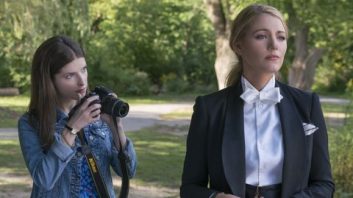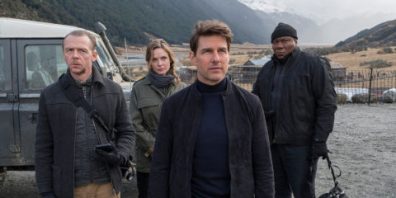Here are ten movies that didn’t make my Best Of 2018 list, but were still good enough for Honorable Mention…

#11) “Ocean’s 8.” Part of the bargain we make while watching movies about a heist or a con is that we’re willing to root for criminals. Whether they’re out for revenge (“The Sting”) or merely a big score (“Kelly’s Heroes”), if the lead characters are likable enough, we want to see them get away with it. In “Ocean’s 8,” there’s likability galore, with a twist — the people planning and executing the crime are women, and they’re just as good as their male counterparts in the Steven Soderbergh movies this one is modeled after. The all-star cast starts with Sandra Bullock and Cate Blanchett, but also includes Sarah Paulson, Rihanna, Mindy Kaling, Helena Bonham Carter, Anne Hathaway, and Awkwafina (in a breakout performance). They’re all at the top of their game, from their performances to their dazzling costumes to their on-screen chemistry — particularly Bullock and Blanchett, who nail every line and expression (like the pros they are). The actresses look like they’re having even more fun than their characters.

#12) “A Simple Favor.” It’s a rollicking adventure with two terrific performances: Anna Kendrick (one of our most reliable movie stars) knocks it out of the park, and Blake Lively does the best work I’ve ever seen from her. They imbue their characters with real personality and share a sparkling chemistry in their scenes together. The plot involves two women who become unlikely friends until one of them disappears and the other has to conduct a search for her. Since “Bridesmaids,” his breakout directorial effort in 2011, Paul Feig has shown a knack for giving talented women a platform to prove their comedy chops, from Maya Rudolph to Sandra Bullock to Melissa McCarthy. In “A Simple Favor,” he turns Jessica Sharzer’s script (from a book by Darcey Bell) into a smart, funny comedy with a plot that has enough twists to keep you involved, and two leading ladies who look like they’re having a great time.

#13) “Little Woods.” In a North Dakota town taken over by fracking companies, Ollie (Tessa Thompson) is barely keeping it together. She’d been sneaking across the border into Canada to get painkillers for her ailing mother, and had turned that into a lucrative side business working for a local dealer selling opioids she’d gotten up north to some of the men working on the fracking lines. But she had to stop when she was arrested and told herself — and her probation officer, Carter (Lance Reddick) — that she’d never do it again. Now, Ollie aches to get out of the upper midwest and start a new life. Unfortunately, there’s a fly in the ointment: Ollie’s sister Deb (Lily James), who has one young son by a guy she’s no longer with, and has just discovered she’s pregnant with another. Writer/director Nia DaCosta, making her feature film debut, shows us the desolation of a small town full of desperate people, much as Debra Granik did in “Winter’s Bone.” “Little Woods” was one of the best things I saw at the St. Louis International Film Festival. I don’t know when it will make it into theaters in general release, but when it does, I strongly recommend you see it.

#14) “Molly’s Game.” In 2014, I got my hands on a copy of Molly Bloom’s memoir, “Molly’s Game,” about her experiences running high-stakes underground poker games in Los Angeles and New York, drawing celebrity players like Tobey Maguire, Ben Affleck, and Leonardo DiCaprio — along with several very rich men you probably don’t know, like a billionaire banker named Andy Beal. I read the book in one day, enjoyed it a lot, and then lined up an interview with Molly (which you can listen to here). Towards the end of our conversation, I jokingly asked whether she’d sold the movie rights yet. She said she hadn’t, but was working on it. Flash forward to January, 2018, when the movie version of “Molly’s Game,” written and directed by Aaron Sorkin, with Jessica Chastain as Molly, opened in St. Louis. As usual, the dialogue in Sorkin’s script sizzles, particularly between Chastain and Idris Elba, who plays the attorney she needs once the FBI comes down on her for running illegal gambling operations. Sorkin gets most of the poker elements right, particularly in explaining to non-poker-playing viewers what’s going on during some of the hands, how better players can terrorize worse players, and how horrific it is to be the victim of a really bad beat. But he messes with the timeline, and included a needless subplot involving Molly’s skiing career and her father. That makes the movie too long, a classic problem for writers who direct their own scripts. Still worth watching.

#15) “Tully.” Charlize Theron is Marlo, a mother of two, extremely pregnant with her third child, and completely overwhelmed by life. Her husband, Drew (Ron Livingston), may be a good father, but he works full-time and travels, so he’s not much help. When the baby comes, it makes Marlo’s life even more all-consuming but her brother, Craig (Mark Duplass) gives Marlo the number of a night nanny — who he’ll pay for. Marlo resists, but eventually calls, and pretty soon we’re introduced to Tully (Mackenzie Davis). She’s a young woman with what used to be referred to as a “free spirit,” but she obviously cares about taking care of not just the baby, but also Marlo, who eventually lowers her shields and lets this woman take over while mom gets some desperately-needed sleep. The middle part of the movie is about the relationship between the two women and the positive impact it has on Marlo’s life. Theron and Davis have wonderful chemistry and solid comic timing in all of their scenes together. Too many other reviews of “Tully” will laud Theron for “being brave” because she doesn’t wear much makeup in the early scenes, and doesn’t shy away from showing off her overweight post-partum body. But by concentrating on that, they’re ignoring how well Theron nails the emotional aspects of Marlo, and shows us yet another aspect of her prodigious talent.

#16) “Can You Ever Forgive Me?” Melissa McCarthy’s new one, “Can You Ever Forgive Me?” gives her a chance to stretch her acting muscles quite a bit, and she’s fully up to it. The movie is based on the story of Lee Israel who, in 1991, was a down-on-her-luck author with biographies of Katherine Hepburn, Tallulah Bankhead, and Estee Lauder to her credit — but nothing since. She had sunk into alcoholism and couldn’t even get her agent to return her calls. Desperate for money, she began forging letters by literary giants of an earlier era (e.g. Noel Coward, Dorothy Parker, Lillian Hellman), which she sold to local bookstores and collectibles dealers for cash. Downplaying her comedic side, McCarthy is terrific as Israel, a woman most people found unpleasant to be around (she felt the same about them). Fans of McCarthy’s earlier work in broad comedies like “Bridesmaids,” “The Heat,” and “Tammy” may be disappointed that she’s trying something different here, but I’m always happy to see a movie about an original character that’s told well. “Can You Ever Forgive Me?” certainly fits that description. It also means I finally liked a Melissa McCarthy movie.

#17) “If Beale Street Could Talk.” Based on a James Baldwin book, “If Beale Street Could Talk” is a love story. Tish (KiKi Layne) and Fonny (Stephan James) are childhood friends who fall in love and look like they’re on their way to a life of happiness. But their world is suddenly turned upside down when Fonny is arrested for a rape he didn’t commit. Despite having a solid alibi, a cruel cop’s lies lead to Fonny’s conviction. To make matters worse, Tish is pregnant with Fonny’s child. Layne and James are wonderful as the young couple, with a chemistry few modern screen pairs can match. I fully believed these two had known each other their whole lives. Brian Tyree Henry has a standout scene as Fonny’s old friend Daniel, just released from prison after also being framed by the police, with chilling information on what it’s like to be behind bars. The pace is too slow (just like writer/director Barry Jenkins’ previous work, “Moonlight”), but “If Beale Street Could Talk” is shot beautifully, the performers are all top-notch, and it carries an important message about the difficulties of growing up black in the USA. Though the story takes place in the early 1970s, it feels contemporary.

#18) “Blindspotting.” Daveed Diggs plays a thirty-something black man named Collin who, as the movie begins, is being released from a two-year stint in prison and sent to a halfway house to serve another year on probation. He seems like a man who’s been changed by the experience, and we’re quickly rooting for him to make it — but there are going to be some challenges. One night on the way home, Collin sees a white cop shoot and kill a black man right in front of his truck. Collin drives away, but is confused about what he should do about what he just witnessed without risking a return to prison. The memory of that moment comes back to him repeatedly throughout the movie, and plays a big part in the very tense climactic scene. I won’t give it away, but it contains some of the most passionate writing — much of it in verse — I’ve seen in a long time. Combined with the lighter elements of the movie, some of which are very funny, I found myself wondering what this strange mix of drama and comedy was. The best analogy I can offer is a mix of “Barbershop” and “Boyz In The Hood.” Like them, “Blindspotting” is timely, amusing, gut-wrenching, and thought-provoking.

#19) “Mission: Impossible — Fallout.” If the goal was to deliver another summer action blockbuster that will satisfy fans of its star and series, then the words “Mission: Accomplished” apply, with some caveats. Like its predecessors, it has an incomprehensible plot interrupted by incredible stunts and action sequences, plus a couple of the trademark ripped-off-face-mask reveals that have been around since the original TV series of over 50 years ago. The interesting thing for me in watching “M:I” movies is trying to figure out which stunts Tom Cruise actually did and which were performed by a stuntman or in front of a green screen with CGI effects added. Cruise is an adrenaline junkie, so it was no surprise when reports emerged about him injuring his ankle so badly while doing a rooftop-to-rooftop leap that filming had to be delayed a couple of weeks. Even if you didn’t know about Cruise’s injury, it still looked painful. When that scene came up at the screening I attended, everyone in the room moaned a collective “ohhhh…” as Hunt slammed into the side of the second roof. Regardless, the action scenes in this sixth installment of the series are dazzling.

#20) “I Feel Pretty.” To say Renee Bennett has low self-esteem is to say that the Pacific Ocean is kinda wet. Renee, Amy Schumer’s character in “I Feel Pretty,” has serious body-image issues — until she falls off a bike at a Soul Cycle class, hits her head, and wakes up believing she’s the hottest woman on the planet. Nothing about her has changed externally, but internally, the delusion empowers Renee. It’s like a classic body-switch movie (“Big,” “Freaky Friday,” etc.), except that it’s the same woman. Amy Schumer’s performance is a big part of what makes “I Feel Pretty” work. Like many other big-screen comic actors who command your attention, she has no shame in doing silly physical comedy, showing off her body (in a PG-13 way), and allowing herself to be the butt of others’ jokes. She had me laughing out loud several times, including one scene where she enters a bikini contest (emceed by Dave Attell, in a hilarious cameo) and takes over the stage completely.
Also see: My list of the Ten Best Movies Of 2018.
Coming tomorrow: my list of the Ten Worst Movies Of 2018.
